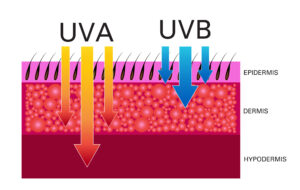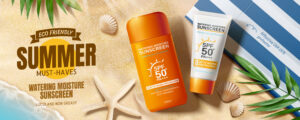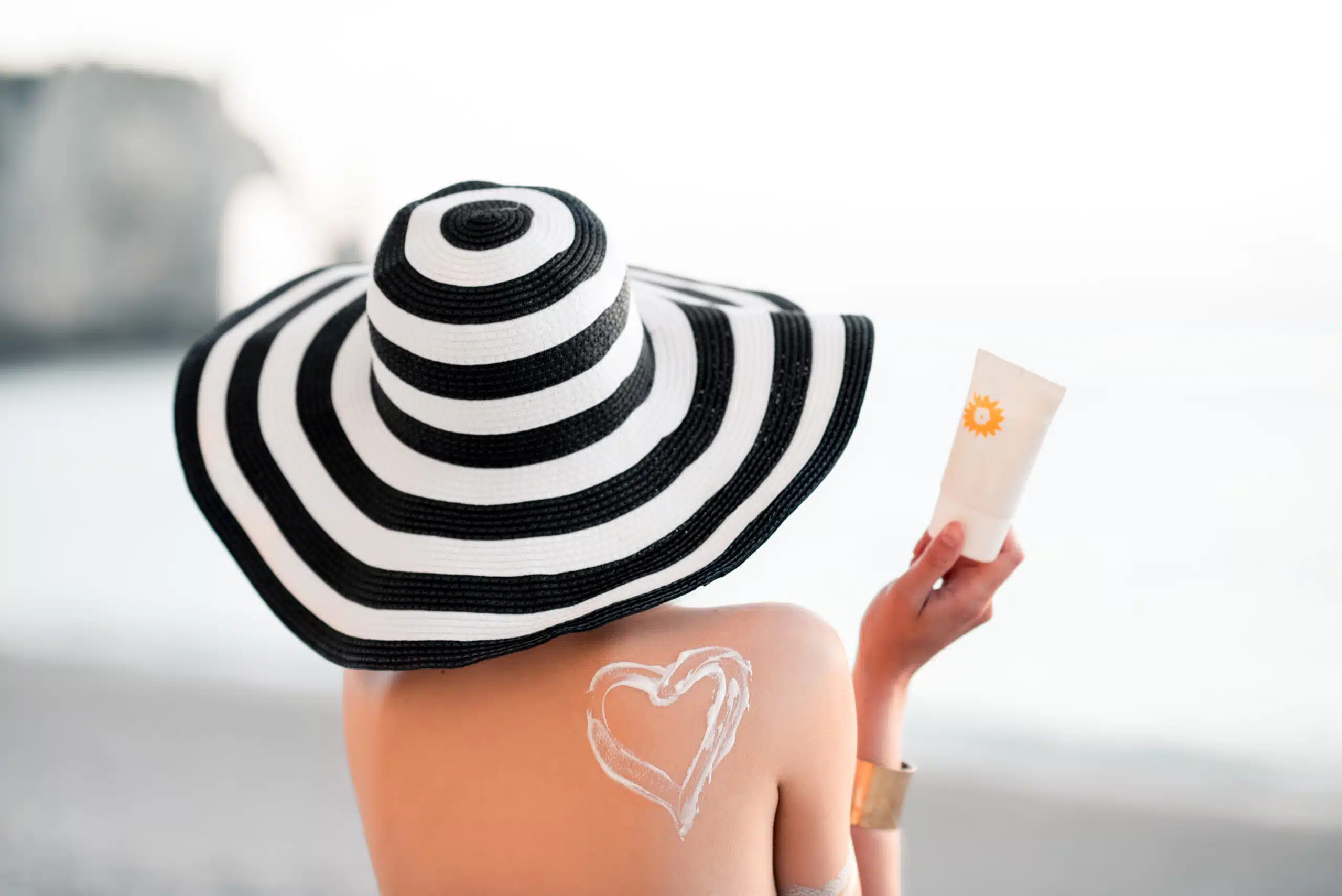How to choose sunscreen for your skin and enjoy a clear, healthy, and youthful look? What are the types of sunscreens? Physical vs chemical sunscreen, the benefits of applying sunscreen, how to apply sunscreen, how to choose the right SPF, Spf 30 vs 50, and more. Here is a complete guide on how to choose sunscreen and the right SPF for your skin.
Skincare is always in season, just like sunscreens. No matter the weather, sun protection is something that you just can’t miss out on if you don’t want to risk facing the consequences of harmful sun exposure on your skin that can cause skin spots, uneven skin tone, wrinkles, fine lines, “leathery skin”, eye damage and even skin cancer. But with a plethora of options available when it comes to choosing a sunscreen for your skin, making the right decision can be really confusing. Add the multitude of doubts, misconceptions, and incomplete information to this mix, and it just amplifies your dilemma ten times more.
To clear the air, wouldn’t it be great to have all the information you need to know about sunscreens — including the latest research, studies, and useful findings along with other sun protection methods — all in one place? Well, we got you covered as that’s exactly what this guide is here to help you with. Here’s your one-stop place to navigate all your sunscreen-related doubts and find everything you need to know to make the right choice.
Ready? Let’s dive in!
Why do you need sunscreen?
The Sun emits harmful Ultraviolet radiations (UV rays) that are dangerous to our skin. They are two types: UV A and UV B. While UV A has harmful effects on the skin and may cause some types of skin cancers, it’s UV B that is responsible for causing sunburns and most skin cancers including melanoma, the most dangerous type of skin cancer. Skin cancer is the most common form of cancer, according to the U.S. Food and Drug Administration (FDA).

Here are some more eye-opening facts about skin cancer as shared by the Skin Care Foundation:
- 1 in 5 Americans will develop skin cancer by age of 70
- More than 50 people die of skin cancer in the U.S. every day
- More than 5 million new cases of nonmelanoma skin cancer are detected in the U.S. each year
As painfully alarming these numbers look, they make the importance of sun protection crystal clear beyond any doubt. Applying sunscreen regularly protects your skin from Sun’s harmful UV rays and its subsequent risks.
What are the benefits of applying sunscreen?
- Protection from UV B rays
- Prevents sunburn
- Minimizes suntan
- Reduces risk of skin cancer
- Keeps Complexion Even. Sun damage is one of the main causes of uneven skin tone and daily use of sunscreen helps to prevent those effects
- Prevents premature aging of your skin causing fine lines and wrinkles
- Leads to overall healthy skin by protecting the essential proteins in the skin like Keratin that is primarily responsible for keeping the skin smooth and healthy both in look and function
In a nutshell, your sunscreen is your skin’s sunglasses.
What does SPF on the sunscreen mean and how to choose the right SPF sunscreen? SPF 30 vs 50?
SPF on the sunscreen stands for Sun Protection Factor which is a measure of protection from the amount of Ultraviolet B (UV B) exposure. So, how to choose a sunscreen with SPF 30 vs 50? For example, if you are going for a walk in the morning and the Sun is not out yet, perhaps SPF 30 will provide sufficient protection for about 120-150 minutes. This SPF 30 vs 50 is just an estimate and may vary based on skin type, the intensity of light, and the duration of exposure. Although SPF may be used to get a rough estimate of the expected duration of protection, it is not the measure of that.
Higher the SPF number, the greater the protection it will provide from UV B rays. A point to note is that no sunscreen can provide 100% UV B rays protection. Comparing SPF 30 vs 50 with respect to UV B, for example, SPF 30 sunscreen will block about 95% of UV B radiations while SPF 50 sunscreen will block 98% of UV B rays. No sunscreen, whether SPF 30 vs 50, can block 100% of the UV B rays. So, sunscreens do greatly lower the damage yet, sun damage at some level is inevitable. Also, the SPF label, 30 vs 50, doesn’t provide any information on the sunscreen’s ability to protect from UV A radiation.
Therefore, one must look out for a broad-spectrum sunscreen for protection from both UV A and UV B rays.

What are the different types of sunscreens? Physical vs Chemical Sunscreen
Sunscreens are of two types based on their difference in composition and the science behind how they work – Physical or Mineral sunscreen and Chemical sunscreen. So, what is the difference (Physical vs chemical sunscreen)? And how to choose the best sunscreen for your skin?
1) Physical Sunscreen or Mineral Sunscreen:
Physical sunscreens act as a shield on your skin deflecting the UV rays thus preventing them from entering your skin and causing damage. Its main ingredient is either Titanium dioxide, Zinc oxide, or both. Both ingredients are proposed to be “generally recognized as safe and effective” (GRASE) by the FDA. Physical sunscreens are best suited for people with sensitive skin as it just stays on the surface and does not get absorbed inside the skin. Let us now check physical vs chemical sunscreen.
2) Chemical Sunscreen:
Chemical Sunscreen acts as a sponge absorbing UV rays and turning them into body heat. It needs 15-20 minutes to get activated after application hence recommended to be applied 20 minutes before stepping out. The most common ingredients in chemical sunscreens are ensulizole, octisalate, homosalate, octocrylene, octinoxate, oxybenzone, and avobenzone.
If we compare physical vs chemical sunscreen, physical sunscreens, unlike chemical sunscreens, get absorbed in the skin and thus have possible chances of affecting the body negatively. As such, the FDA has asked for more data on some of their ingredients looking to evaluate the quantity in which it gets absorbed and if there are any harmful effects on the skin because of it. Although the FDA has asked for more data on them, it hasn’t characterized them as unsafe or dysregulated their use. In fact, there has been no scientific research giving evidence that its usage can lead to health issues.
Dermatologists most commonly recommend mineral or physical sunscreen over chemical ones as they don’t get absorbed into your skin but at the same time because mineral sunscreen sits on your skin’s surface and may cause skin irritation especially for people with sensitive skin types so they should be watchful about it. Also, while comparing physical vs chemical sunscreen, when it comes to protection from UV rays, the benefits that chemical sunscreen provides far outweighs the risk involved in applying it. Besides, having protection is better than no protection at all.
So, now you know the difference between physical vs chemical sunscreen, you can make a choice considering the pros and cons of physical vs chemical sunscreen, as mentioned below.
What are the pros and cons of physical vs chemical sunscreen?
Physical sunscreen
Pros –
- Doesn’t get absorbed into the skin so no chance of interfering with the body’s biochemistry
- No wait time is needed, it starts to work immediately after applying
- Less likely to trigger skin issues thus ideal for children and people with sensitive skin
- Safer for people concerned about long-term sun exposure
Cons –
- May leave a white shield as it sits on your skin
- More frequent application is required as can rub off, sweat off and rinse off easily
- More quantity is needed for full coverage and to be fully effective
- Thicker in consistency, so harder to apply
Chemical sunscreen
Pros –
- Quick and easy to apply
- Doesn’t leave a white film on the skin
- Less product quantity is needed
- Gives you an overall skincare boost in a single product as typically comes with other ingredients, like peptides and antioxidants
Cons –
- Need to apply it 15-20 minutes before heading out for it to get activated to function
- Comes with an increased risk of irritation, sensitivity, and associated concerns as it gets absorbed by the skin
- Can clog pores and increase the risk of breakouts on acne-prone or sensitive skin
- Need to be more careful about choosing it as ingredients in some of them might not suit your skin or body
How to choose the best sunscreen for your skin type?
Each person is different and so are their skin and body. The best is to stay informed and try a couple of different sunscreens until you are satisfied with their results, then stick to that one.
That said, some things that you should definitely make sure of when buying sunscreen are:
1. Broad-spectrum protection
A broad-spectrum sunscreen, irrespective of physical vs chemical sunscreen, protects your skin against both UVA and UVB rays
2. An SPF of 30 or higher
Considering SPF 30 vs 50, go for an SPF that meets your day-to-day activities, lifestyle, climatic conditions where you live, and application style. For example, if you don’t like to apply ample sunscreen then go for a higher SPF for more protection.
3. Water-resistant
This ensures that the sunscreen will provide sun protection while swimming, sweating during workouts, or other similar activities, for a set amount of time — either 40 or 80 minutes — as mentioned on its label. Please note that no sunscreen is waterproof so be careful about any such claim
4. Lab-tested and dermatologist approved
5. Right SPF for your skin
6. Mineral or chemical, based on your skin type or preference
So, how to choose sunscreen for your skin? Well, the best type of sunscreen is the one that offers the top three mentioned above. You already now know the difference between physical and chemical sunscreen so the type or the brand you use is your choice.
Sunscreen is available in lotions, creams, gels, skin butter, wax sticks, and sprays. Sprays are quick and easy to apply but they have the challenge of uneven application as you are spraying it all over and not applying it by hand. So, if you go for sprays, make sure you give them a good shake and apply it thoroughly. Lotions provide way more even coverage in that sense as you take a good squeeze in your hand, apply evenly and you’re done!
Also, different sunscreens contain different ingredients. It’s important to avoid the ones that have ingredients that don’t suit your skin.
How to apply sunscreen to get maximum protection and the best results?
The key is to apply it generously and evenly so that it covers all the areas evenly. Also, you must apply it for at least 15-20 minutes before heading out if you are using a chemical sunscreen. If you are going to the beach and carrying your sunscreen to apply it there, you can expect to return looking like a squirrel.
Are there any specific skin areas where you should apply your sunscreen more carefully?
Be extra careful while applying sunscreen around your eyes as the skin around your eyes is thinner and thus more sensitive as compared to any other part of the body. Make sure the sunscreen doesn’t get into your skin and its ingredients don’t cause irritation to your eyes and surrounding areas. If you have sensitive skin, especially around your eyes, applying physical sunscreen or SPF eye sticks is a good option for you when you compare physical vs chemical sunscreen. You can also try eye creams that offer SPF protection as well.
Should you wear sunscreen even if you are not going out in the sun?
According to the American Academy of Dermatology, 80 percent of the sun’s rays can pass through clouds and reach your skin even on an overcast day. Similarly, 80 percent of the UV rays can be reflected back by snow. In fact, the higher your altitude, the higher the Sun exposure you are at. So, if you think it’s OK to let go of sunscreen on cloudy days or if you are on a skiing vacation, think again.
Sunscreen is an important part of preventive care habits that should be followed all year long, including the winter months.
How to choose the right SPF for yourself? SPF 30 vs 50?
The right SPF, whether SPF 30 vs 50 or even higher, for you will depend on:
- The amount of time you plan to spend out in the sun.
- Your lifestyle. Does it demand you to spend more time outside?
- The sun exposure duration and intensity in your area of living.
- Your sunscreen application amount, method, and preference. Do you not like or miss applying sunscreen in sufficient quantity? Then sunscreens with a higher SPF will be a good option for you.
- Your skin type. If it’s dry, oily, or normal. For instance, if it’s oily then you might consider a sunscreen-infused moisturizer.
- Is your skin allergy or acne-prone? If yes then you will benefit from preservative-free, fragrance-free skin products.
But overall, for daily use on normal moderate exposure days, you should look out for a sunscreen that must be broad-spectrum, water-resistant, and with SPF 30 or above.

How much sunscreen should you apply for full-body coverage?
One ounce or one shot-glass is considered an optimal quantity to provide full-body coverage for an adult or child with an average body size.
What is the best way to apply sunscreen?
Take a good portion of sunscreen on your palm, lather it evenly on your skin, and just gently spread overall evenly using your fingers until it gets blended well with your skin. Make sure you apply sunscreen at least 15-30 minutes in advance before stepping outside.
How many times a day should you apply sunscreen?
You should apply sunscreen at least once every day and retouch after every 2 hours if you are still out or after swimming, sweating or any activity that would have taken it down.
Can you skip applying sunscreen on your face if you wear sunscreen-infused makeup?
No, you can’t and shouldn’t skip applying sunscreen unless you intend to apply an ounce of that makeup on your skin. The amount of makeup we apply isn’t sufficient to fulfill its sun protection requirement.
Share some tips for skin protection from UV rays besides sunscreen
According to a report published by National Cancer Institute, adopting Sun-protective behavior can lower the risk of sun exposure and the subsequent repercussions that may follow. Apart from knowing how to select the best sunscreen for your skin, you must also consider other sun-protective strategies.
Here are some important sun-protective behaviors to engage in when outside:
- Don’t go outside between 10 AM to 4 PM when the sun rays are most intense
- Wear lightweight, tightly knitted, breathable clothing that covers most of your skin eg. long sleeve shirts and pants that cover your full hands and full legs
- Wear sunglasses, wide-brim hats, and carry an umbrella when stepping out in the Sun
- Don’t use tanning beds or sunlamps
Who should avoid using sunscreen?
Sunscreens should be used daily as a part of a healthy skin care ritual by everyone except for infants below 6 months of age.
For babies younger than 6 months, the American Academy of Pediatrics approves of the use of sunscreen only if appropriate clothing and shade are not available. Parents should try to avoid sun exposure, especially out of direct sunlight, and dress their baby in lightweight clothing that covers most of its skin. They may apply a small amount of sunscreen to exposed areas such as the baby’s face and the back of its hands.
Should you consult your skin doctor before applying any sunscreen?
You should consult a skin specialist if your skin is highly sensitive before trying a new sunscreen or skin product. Medical consultation is also recommended before applying sunscreen to infants less than 6 months old.
Hope this guide would have helped you clear most of your sunscreen-related doubts and would be useful in choosing the right one for yourself. If it has, please do share it with your family and friends so that they can benefit from it too. After all, sharing is caring! :)vs

Pragya Singh
Related Posts

Healthy Aging Month 2022: You Are The “Driver” Of Your Health And Wellness






